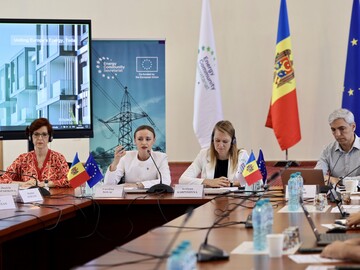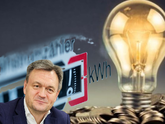
Consultations have begun in Moldova on a draft National Strategy on Long-term Building Stock Renovation until 2050
According to the Ministry of Energy, the document has been submitted for public consultations with representatives of professional associations, decision-makers, experts, and key players in the energy and construction sectors to discuss strategic directions for improving the energy efficiency of buildings in Moldova. The event was organized by the Ministry of Energy in cooperation with the United Nations Development Program (UNDP in Moldova) and the Energy Community Secretariat. State Secretary of the Ministry of Energy Carolina Novac thanked development partners for their support in the development process and called on all stakeholders—authorities, the private sector, and citizens—to join the joint efforts to implement the strategy. According to her, the National Strategy on Building Stock Renovation is not just a government policy document, but a declaration of the authorities' firm commitment to a greener and more sustainable future. Given that the building sector accounts for more than 53% of final energy consumption and almost half of gross domestic consumption, the need for systemic intervention is urgent. Buildings constructed between 1960 and 1990 are largely energy inefficient, generating energy losses of up to 60% and resulting in high costs for households and institutions. The Strategy sets out a framework for transforming the building stock into a decarbonized and highly energy-efficient one by 2050. The document identifies priority measures and strategies, assesses the need for public and private investment, and is aligned with the National Integrated Energy and Climate Plan for 2025–2030, which targets annual savings of at least 0.8% of average final energy consumption. Priority measures include: attracting private investment in the housing sector; developing the energy services market (ESCO); mobilizing local budget resources for building renovation; and strengthening the construction sector. The strategy is in line with EU practice and reflects the recommendations of the European Commission and the Energy Community. As noted by UNDP Moldova, the National Strategy on Long-Term Building Stock Renovation for 2025-2050 aims to improve the energy efficiency of public, private, and residential buildings in Moldova by 2050, contributing to the transformation of all existing buildings into nearly zero-energy buildings. More than 75% of residential buildings in Moldova were built before 1990, when regulatory requirements for thermal insulation of buildings were limited and less stringent. Thus, these buildings have the greatest potential for energy savings and greenhouse gas emissions reductions. The document proposes a set of measures aimed at achieving climate and energy efficiency goals in the residential sector: identifying specific energy renovation measures (minor – reducing energy consumption by up to 30%, moderate – reducing consumption by 30% to 60%, major – more than 60%); assessing the need for public and private investment; proposing sustainable financing mechanisms and incentives for renovation. Improving the energy efficiency of buildings will benefit both people and society. This means lower energy bills and more disposable income, which can subsequently be used to cover other expenses; improved thermal comfort and living conditions; improved building safety; improved architectural appearance and increased building value; creation of new jobs for all related professions involved in energy efficiency projects; strengthening of the country's energy security. The consultations were attended by representatives of government authorities, academia, civil society, and experts from the energy and construction sectors. // 31.07.2025 — InfoMarket







